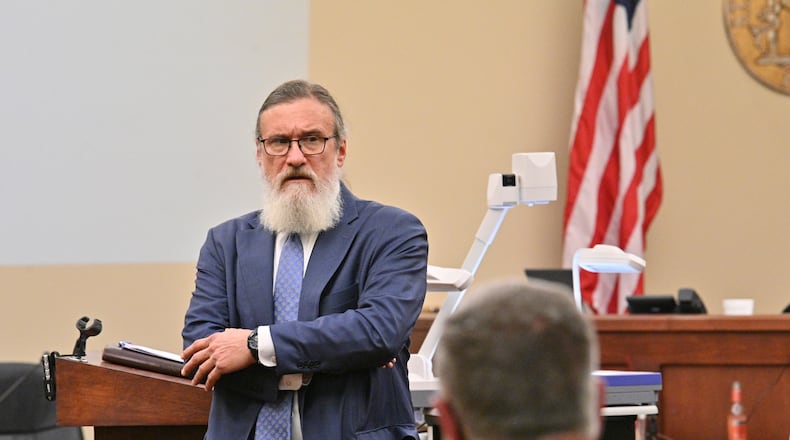A report submitted this week to the Supreme Court of Georgia recommends that Americus attorney William McCall Calhoun Jr. have his law license suspended following his felony conviction earlier this year for taking part in the Jan. 6, 2021, U.S. Capitol riot.
The report follows a hearing in June where Calhoun and his lawyer, Cartersville attorney Don Evans, argued Calhoun should be allowed to keep his license. In the hearing, Evans said his client intends to appeal the felony conviction and should be allowed to continue to practice law while that process plays out.
“At least 41 clients here are going to lose the lawyer that they’ve already paid, that they selected, that’s their counsel of choice,” he said. Calhoun has continued his south Georgia law practice ever since his release from federal custody in the weeks after the riot.
The suspension recommendation by LaRae Dixon Moore, a Columbus attorney appointed to oversee the disciplinary hearing, is the latest fallout resulting from Calhoun’s participation in the riot. In a one-day bench trial in Washington, D.C., on March 20, U.S. District Judge Dabney Friedrich found the 59-year-old guilty of obstructing an official proceeding of Congress, a felony, as well as four misdemeanors. Sentencing is set July 28.
That conviction prompted the State Bar of Georgia to begin disciplinary proceedings against Calhoun. Bar rules call for lawyers convicted of felonies and certain misdemeanors to be stripped of their ability to practice law. If the felony charge stands, Calhoun likely would face permanent disbarment.
Calhoun complained in the June hearing that he was being politically persecuted and did nothing on Jan. 6 that should result in losing his livelihood.
Moore’s recommendation goes to the state Supreme Court, which has the final say on whether Calhoun could continue practicing as an attorney. The court hasn’t indicated when it will act on the report.
“I did nothing to bring dishonor on myself, or the State Bar,” Calhoun told Moore. “The government is trying to set a precedent for prosecuting and convicting a lawyer for thinking the wrong way. That’s basically what this is about.”
Moore brushed aside what she described as attempts to “relitigate” Calhoun’s criminal trial.
“The issue, in my mind, is simply whether or not there is a felony conviction or misdemeanor convictions involving moral turpitude. That’s it,” she said.
Calhoun was part of the initial wave to enter the Capitol. Video footage from the day — much of it shot by Calhoun himself — shows him moving with the crowd through the Capitol with a group he repeatedly referred to as “the Vanguard” in social media posts. He made it as far as then-House Speaker Nancy Pelosi’s office door before eventually leaving.
Despite his claims that prosecutors singled him out, the U.S. Department of Justice has charged more than 310 defendants with the same felony charge. Many of them, like Calhoun, were among those who were in the initial wave of rioters to penetrate deep into the Capitol forcing Congress to suspend certification of the 2020 presidential election for hours until the building was cleared and it was safe to return.
In his trial, prosecutors pointed to months of angry, sometimes violent, comments Calhoun posted to social media about the election and urging others to take up arms to overturn the results as evidence that his intent in entering the Capitol was to stop the certification of Joe Biden.
“We have a communist revolution happening before our very eyes to steal this election,” he wrote in a post a day after the presidential election. “Americans get ready to rise up and kill the Democratic communists before they do it to us.”
Calhoun’s felony conviction carries a possible penalty of up to 20 years in prison, but he is unlikely to serve much — if any — prison time. During the trial, Friedrich said she was concerned that Calhoun’s behavior while in the Capitol more closely resembled that of defendants charged with misdemeanors. Unlike many others, Calhoun is not accused of assaulting police or damaging property, and he apparently did not enter any Congressional offices.
In a note filed on the court docket, Friedrich instructed prosecutors to explain in their sentencing recommendation “why the defendant’s conduct in this case warrants a sentence different from those imposed in other January 6 cases before this Court, including those in misdemeanor cases, in particular the sentence imposed on the codefendant in this case.”
In March 2022, Friedrich sentenced Calhoun’s codefendant, Verden Andrew Nalley, a 51-year-old construction worker from Buford, to two years probation after he pleaded guilty to a misdemeanor charge in a plea agreement.
So far, 24 people with ties to Georgia have been charged with participating in the Jan. 6 riot. Of that number, 20 have either pleaded or been found guilty of crimes. The cases for the four remaining defendants are open.
About the Author
The Latest
Featured



